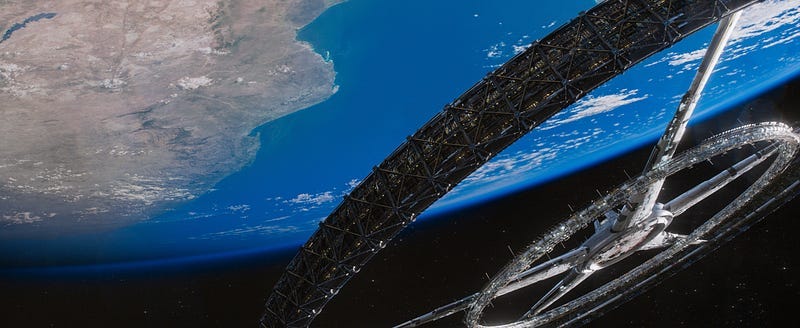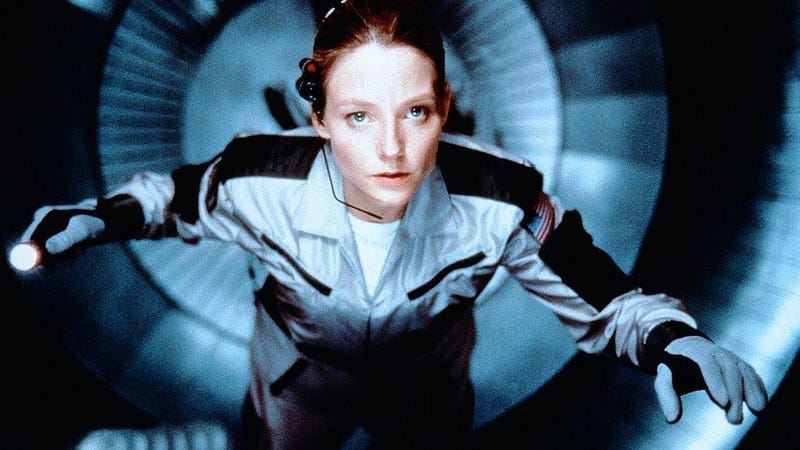What can sci-fi movies teach us about technology ethics?
Featuring Jurassic Park, Minority Report, Limitless, Ghost in the Shell, Ex Machina, The Day After Tomorrow, Contact, and more …

Who’d of thought a few years ago, that ethical innovation would be such a hot topic. Yet every other day, it seems, some company or scientist discovers to their dismay that, as technologies become ever-more powerful, so do the ethical challenges they raise.
Gene edited human embryos, predictive policing, facial recognition, babysitter screening, data privacy and social media, and everything AI it sometimes seems — these and many other areas of tech innovation are throwing up complex social and ethical challenges that don’t have easy answers.
As they do, how can innovators, companies, consumers, and others, begin to navigate them?
Surprising as it may seem, one way is to watch more science fiction movies.
Sci-fi films are notorious for getting the “science” bit wrong. But because they often draw on stories about technology, people, and what can go wrong when you mix them together, many of these movies provide a great entry in to technology ethics, and the social responsibility that comes with great technological power.
This is the idea behind the book Films from the Future, which tackles what can go wrong with powerful emerging technologies, and how to steer things in the right direction.
Based on the book, here are twelve movies that are worth (re)watching if you want to get smart about technology ethics and responsible innovation, and be entertained along the way:
Jurassic Park (1993)
What’s it about: A wealthy entrepreneur is obsessed with creating the best theme park ever by using genetic engineering to bring back dinosaurs, until the exhibits start eating the customers …
What to watch for: Despite it’s age, Jurassic Park is a well-crafted action movie that touches on themes that are more relevant than ever today, including genetic engineering, de-extinction, complexity theory, and the follies of short-sighted entrepreneurial ambition. Watch the movie for the cautions against developing powerful technologies without a thought to the consequences, and the celebration of the awesomeness of nature — even when it’s less than natural!
Where to watch it: iTunes, Amazon, Google
Never Let Me Go (2010)
What’s it about: Three young friends grapple with the reality that they were cloned so their organs could be harvested to keep others alive, in a society that sees them as less-than-human.
What to watch for: Never Let Me Go conjures up an alternative past where human cloning has been developed to benefit people at the expense of the clones they get their replacement body parts from. Watch the movie for a searing indictment of how technologies developed for the “greater good” can smash the lives of individuals that get in their way, and how good intentions too-easily slip into turning a blind eye to unethical behavior.
Where to watch it: iTunes, Amazon, Google
Minority Report (2002)

What’s it about: Genetically altered “precogs”predict murders before they occur, allowing law enforcers to incarcerate would-be murderers before they commit a crime; but the system isn’t as infallible as people think …
What to watch for: Many of the display technologies in Minority Report have inspired new innovations, although the genetically engineered precogs in the film are pure science fantasy. Watch the movie for the way it poses tough questions about predicting and acting on criminal intent, as real-world technologies increasingly claim to be able to do the same using AI, big data, and other means.
Where to watch it: iTunes, Amazon, Google
Limitless (2011)
What’s it about: A failing writer gets access to a new drug that supercharges his brain, and transforms him from a loser to a winner. But it’s not without its downsides…
What to watch for: As interest grows around the use “smart drugs” that allegedly enhance cognitive ability (and by inference, the chances of success), Limitless provides an intriguing perspective on their use and abuse. Watch it for the way it explores the often-complex issues around the personal and social consequences of using designer substances to increase mental abilities.
Where to watch it: iTunes, Amazon, Google
Elysium (2013)

What’s it about: The uber-rich of the future decamp to a luxuriant space station, while back on Earth the poor struggle to scratch a living while supporting the opulent lifestyles of the wealthy.
What to watch for: Elysium is an intriguing, if sometimes over-earnest, social commentary on the social injustices propagated by widening wealth disparity. Watch the movie for the medical diagnostics/repair technologies that loosely reflect real-world advanced in biomonitoring and 3D tissue printing, the social disparities associated with preferential access to powerful technologies, and the way that AI and robots impact rich and poor communities differently.
Where to watch it: iTunes, Amazon, Google
Ghost in the Shell (1995)
What’s it about: A cyborg in a futuristic “special ops” unit grapples with what it means to be human when her body is not her own, and false memories and identities are being implanted in technology-augmented brains.
What to watch for: Ghost in the Shell is a deeply thoughtful exploration of what it means to be human in a future where body parts can readily be replaced by machines, and where brain-machine interfaces erode the boundaries between who you think you are, and who you may be. Watch it for the meditative sequences on what it is to be human in an augmented future, and what it means to have value in a post-human world.
Where to watch it: iTunes, Google
Ex Machina (2014)
What’s it about: A brilliant but self-centered and manipulative entrepreneur creates an artificial intelligence that learns about human behaviors and biases from studying Google-like searches, and is surprised when his creation turns against him.
What to watch for: What would happen if we create AIs that know enough about human biases and heuristics to manipulate our behavior to their ends? Ex Machina provides an intriguing glance into a plausible future where AIs learn to press our metaphorical buttons, without being constrained by the cognitive biases and values that limit human behavior. Watch the movie for its exploration of disturbing questions around how AIs might learn to use our biases against us.
Where to watch it: iTunes, Amazon, Google, Netflix
Transcendence (2014)

What’s it about: A brilliant AI scientist’s mind is fused with a supercomputer, and the resulting superintelligence makes massive strides in nanotechnology, while threatening human life as we know it.
What to watch for: Although Transcendence plays fast and lose with technological reality, it raises enough questions around technological convergence, techno-terrorism, and the line between “could” and “should”, to make it interesting. Watch it for the impossible yet entertaining emergence of technologies that bring about the Singularity, and how promises of extreme technological power leads to extreme actions to oppose it.
Where to watch it: iTunes, Amazon, Google, Netflix
The Man in the White Suit (1951)

What’s it about: A smart but socially naive scientist invents a super-strong stain-resistant fabric, and can’t understand why everyone in the industry turns against him.
What to watch for: Although it was made over half a century ago, The man in the White Suit provides a surprisingly accurate portrayal of what it’s like to be an obsessively curious scientist, and how easy it is to get so caught up in the process that you fail yo see the broader social landscape around new inventions. Watch the movie for parallels with modern-day nanotechnology, and how the social dynamic between the invention and the people it potentially impacts in the film is remarkably prescient of modern-day tensions.
Where to watch it: iTunes, Amazon, Google
Inferno (2016)
What’s it about: A wealthy scientist is so concerned about the predicted consequences of global overpopulation, that he genetically engineers a virus to kill half the world’s people.
What to watch for: Despite the paper-thin plot, Inferno illuminates the dangers of slipping into deeply unethical behavior while trying to address perceived global risks. It also draws on very-real debates around gain of function research (making viruses more virulent in order to study them), and dual use research (inventing technologies that can be used for bad as well as good). Watch the movie for an often-mindless but nevertheless engaging plot that occasionally raises serious questions around the ethical uses of science and technology, especially when they are in the hands of people who flout the norms of conventional behavior.
Where to watch it: iTunes, Amazon, Google
The Day After Tomorrow (2004)

What’s it about: Human-driven global warming leads to a sudden and catastrophic shift in the Earth’s climate, endangering lives and transforming the geopolitical landscape.
What to watch for: Despite The Day After Tomorrow having a somewhat confusing and at times deeply implausible message about global warming, the film nevertheless challenges viewers to think about what acting responsibly means in a world where we are right on the edge of bringing about catastrophic and irreversible changes in the Earth’s climate. Watch it for impossible but nevertheless entertaining super-freezing storms, and the underlying reality that what we do to the climate matters, and not always in ways that are easy to predict.
Where to watch it: iTunes, Amazon, Google
Contact (1997)
What’s it about: A researcher perseveres in her search for extraterrestrial life, driven by her hopes, and tempered by her belief in the scientific process.
What to watch for: Contact beautifully captures the passion and thrill of what it’s like to be a scientist and to do science . But it’s also a revealing study of the intertwined relationship between science and belief. Watch the film for the way it gets under the skin of sometimes-misguided ideas about science and belief, and reveals how the discipline of science, when combined with our passions and beliefs, elevates who we are.
Where to watch it: iTunes, Amazon, Google
Andrew Maynard is Director of the Arizona State University Risk Innovation Lab, and author of Films from the Future: The Technology and Morality of Sci-Fi Movies








